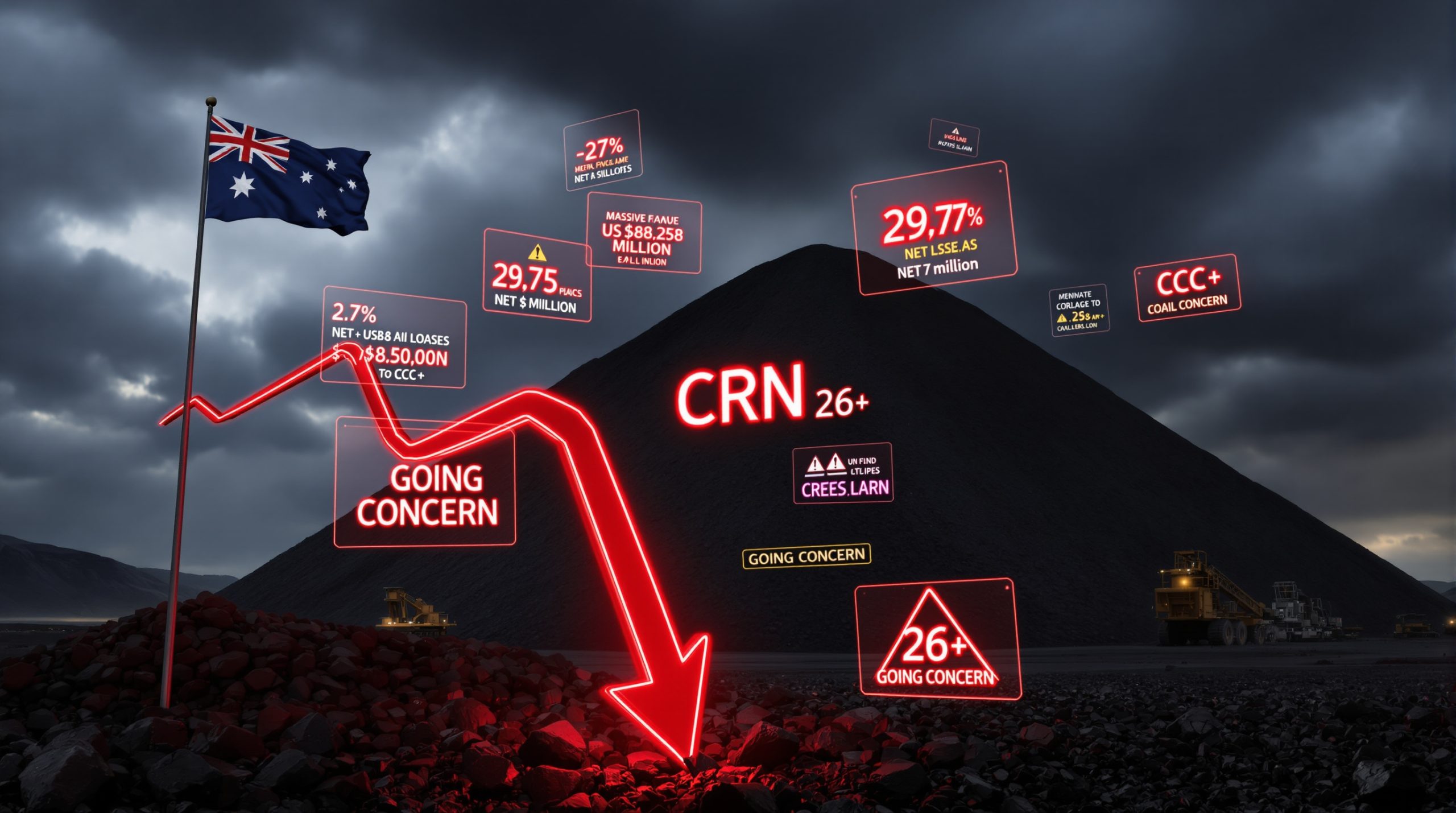Why Did Glencore Choose to Remain on the London Stock Exchange?
In a significant development for global mining and UK financial markets, commodities giant Glencore has decided to maintain its primary listing on the London Stock Exchange after months of speculation about a potential move to the United States. The decision, announced on August 6, 2025, represents a rare vote of confidence in London's financial markets at a time when many high-profile companies have been departing for other exchanges.
Decision After Extensive Research
Glencore's choice comes after what CEO Gary Nagle described as "extensive research" into major exchanges worldwide. The company's leadership team conducted a thorough analysis of potential listing venues before concluding that remaining in London was the most strategic choice for shareholders.
"A move in our primary listing would not be value accretive for Glencore at this stage, having done that thorough analysis," Nagle explained during the announcement. "Therefore, we keep it on a watching brief, but will remain listed in London for the moment."
The mining giant had initially announced in February 2025 that it was considering relocating its primary listing, triggering speculation about yet another potential departure from London's struggling markets. This six-month evaluation period involved detailed assessments of regulatory environments, investor bases, and potential valuation impacts across multiple global exchanges.
Factors Behind the Decision
Several critical factors influenced Glencore's decision to remain in London, with index inclusion considerations playing a particularly important role. According to industry analysts, the company's unlikely inclusion in the prestigious S&P 500 index significantly dampened the potential benefits of a US listing.
While Glencore has experienced a 26% share price decline over the past year, Nagle emphasized this was attributable "at least in part to lower coal prices" rather than the company's listing location. This acknowledgment highlights how commodity price fluctuations often impact mining companies more significantly than exchange-specific factors.
"For many companies, the perceived advantages of a US listing—such as access to deeper capital pools and higher valuations—may be more theoretical than practical, especially in certain sectors," notes Michael Jacobs, corporate partner at Herbert Smith Freehills Kramer.
Regulatory burden and potential litigation risks in US markets were also carefully weighed. US exchanges typically impose more stringent disclosure requirements and carry higher compliance costs, creating additional overhead that would need to be offset by tangible valuation benefits.
What Does This Mean for London's Financial Markets?
Rare Win Amid Market Shrinkage
Glencore's decision represents a significant boost for London's financial markets, which have been struggling with diminishing listings and a troubling exodus of companies. The UK's capital markets have been shrinking due to a dearth of new share issues and numerous public-to-private transactions as depressed valuations make companies attractive takeover targets.
The mining giant's commitment to London sends a powerful signal that the exchange still offers compelling value for global mining landscape. This is particularly meaningful coming from one of the world's largest commodities traders and mining companies, with operations spanning more than 35 countries.
Market analysts suggest this decision could potentially slow the momentum of companies leaving London, though significant challenges remain in restoring the exchange's global competitiveness and addressing persistent valuation gaps compared to other major markets.
Recent High-Profile London Departures
Glencore's vote of confidence comes against a backdrop of numerous high-profile departures that have raised concerns about London's standing as a global financial center:
- Travel giant TUI recently announced plans to abandon its London listing
- Netherlands-based food delivery company Just Eat Takeaway.com has already completed its departure
- Mining behemoth BHP Group ended its dual listing structure in 2022, consolidating in Sydney
- Energy supermajor Shell is actively considering relocating to the US to address a significant valuation gap with American rivals
This trend of departures has been particularly pronounced in the natural resources sector, where companies have increasingly sought listings in jurisdictions perceived as offering higher valuations or better alignment with their operational footprints.
Following Glencore's announcement, shares dropped approximately 4% as some investors expressed disappointment with the decision to remain in London. This market reaction suggests a segment of shareholders had been anticipating potential valuation benefits from a US relisting.
How Is the UK Responding to Market Challenges?
Regulatory Reforms to Attract Listings
The UK government and financial regulators have been implementing a suite of reforms aimed at enhancing London's attractiveness as a listing destination. These initiatives directly address concerns that have contributed to the exodus of companies seeking more favorable regulatory environments.
Key reforms include:
- Reducing shareholder vote requirements for certain transactions, streamlining corporate actions
- Easing prospectus requirements for companies listing shares, reducing administrative burdens
- Introducing more flexible listing structures to accommodate different corporate governance models
- Revising rules around dual-class share structures to attract innovative growth companies
These changes represent part of a broader strategy to reverse the trend of departing companies while creating conditions that might attract new listings. However, implementation remains a work in progress, with many market participants urging faster and more comprehensive reforms.
Investment Community Perspective
Antonio Simoes, CEO at Legal & General—Britain's largest investor—has noted "pent-up demand to invest in Britain from international clients, including in London-listed companies." This suggests an underlying interest in UK markets that could be catalyzed by the right combination of regulatory reforms and economic growth.
"The more we get the country growing, the stock market will be a reflection of that," Simoes explained. "We just want to see those reforms coming through, so that there's more capital investing in the UK."
This perspective highlights how market performance is inextricably linked to broader economic conditions. While regulatory reforms can enhance market structures, sustained economic growth remains essential for driving company valuations and attracting both domestic and international capital.
What Are the Market Reactions to Glencore's Decision?
Mixed Investor Response
Glencore rejects US listing in boost for UK markets, yet the announcement triggered a notable 4% drop in its share price, indicating mixed investor sentiment regarding the decision. While some investors welcomed the stability and continuity of remaining in London, others had clearly been anticipating potential valuation benefits from a US relisting.
Investment analysts had previously suggested that a US listing might boost Glencore's valuation by providing:
- Access to a deeper pool of potential investors
- Greater analyst coverage in the world's largest capital market
- Potential inclusion in major indices that could drive passive investment flows
- Alignment with pricing of US-listed mining and commodity trading peers
The market reaction reflects this split in expectations, with some shareholders seemingly disappointed by the foregone opportunity for potential share market performance insights suggest this type of price movement is not unusual when companies make strategic decisions that differ from market expectations.
Expert Analysis on US vs. UK Listings
Industry experts have highlighted the complex tradeoffs involved in listing decisions, particularly for resource companies like Glencore. According to a Reuters report, while US listings are "perceived to offer access to deeper pools of capital and higher valuations in certain sectors," these advantages are "often illusory."
The US markets come with "significant regulatory burden, litigation risk, and increased disclosure requirements as well as big challenges in gaining index inclusion," according to experts. These factors can substantially offset the theoretical benefits of higher valuations, particularly for established companies with complex global operations.
For mining companies specifically, London still offers several distinct advantages:
- A historical concentration of mining sector expertise among analysts and investors
- A regulatory framework familiar with the complexities of resource extraction businesses
- Geographic proximity to European financial institutions and African operations
- Strong institutional understanding of cyclical commodity businesses
"Index inclusion remains one of the most significant but least discussed factors in listing decisions," notes a London-based mining analyst. "Without S&P 500 inclusion, many of the liquidity benefits of a US listing simply don't materialize."
What Are the Broader Implications for Global Mining Companies?
Strategic Listing Considerations
Glencore's decision-making process illuminates the complex calculations mining companies must make when evaluating optimal listing locations. Beyond simple valuation metrics, companies must consider:
- Regulatory burden and compliance costs across different jurisdictions
- Investor base familiarity with their business model and industry
- Analyst coverage quality and depth in their sector
- Potential for index inclusion and resulting passive investment flows
- Currency exposure and hedging considerations
- Corporate governance requirements and shareholder rights structures
- Proximity to operational footprint and key markets
The mining sector faces particularly unique considerations given the inherent cyclicality of commodity prices, capital-intensive development cycles, and complex geopolitical exposures. These factors can influence how investors in different markets value such companies.
The experience of Glencore suggests that even with potential valuation gaps, the total cost-benefit analysis of relisting may not always favor moves to markets with superficially higher valuations.
Future Outlook for Mining Company Listings
Despite Glencore's decision to remain in London, industry experts anticipate continued pressure on mining companies to optimize their listing venues. The persistent valuation gaps between exchanges remain a strategic concern for corporate boards and activist shareholders.
Several factors may influence future listing decisions in the mining sector:
- Commodity price trends: Sustained price strength in specific commodities may drive listing preferences toward exchanges with deeper expertise in those resources
- ESG pressures: Increasing focus on environmental, social and governance factors may favor exchanges with sophisticated ESG frameworks
- Geopolitical considerations: Mining operations in politically sensitive regions may influence preferred listing jurisdictions
- Index methodology changes: Modifications to index inclusion criteria could significantly impact listing attractions
- Regulatory convergence: Ongoing harmonization of standards could reduce some cross-border differences
While Glencore rejects US listing in boost for UK markets, it's notable that the company explicitly characterized its position as keeping the situation "on a watching brief." This suggests the door remains open for reconsideration should market conditions or trade war impacts strategies change in the future.
According to The Guardian, the company's decision represents "a rare piece of good news for the London Stock Exchange" amid ongoing concerns about its diminishing global relevance.
Frequently Asked Questions About Mining Company Listings
Why Do Companies Consider Changing Their Primary Listing?
Companies evaluate changing their primary listing for multiple strategic reasons:
- Valuation enhancement: Seeking higher multiples in markets that traditionally value their sector more generously
- Capital access: Tapping into deeper pools of investment capital with specialized sector knowledge
- Investor alignment: Moving closer to investor bases that better understand their business model
- Index inclusion: Positioning for inclusion in major stock indices that drive substantial passive investment flows
- Analyst coverage: Attracting more comprehensive and knowledgeable analyst coverage
- Regulatory efficiency: Optimizing regulatory requirements to match operational realities
- Corporate actions: Facilitating potential mergers, acquisitions, or spinoffs
For mining companies specifically, listing decisions often reflect the geographic distribution of their assets, the commodities they produce, and how tariffs impact on markets across different jurisdictions.
What Advantages Does London Offer Mining Companies?
Despite recent high-profile departures, London continues to offer distinct advantages for mining companies:
- Sector expertise: A long-established ecosystem of mining analysts, investors, and service providers
- Regulatory familiarity: A framework accustomed to the complexities of resource extraction businesses
- Global perspective: Strong international orientation that accommodates companies with dispersed operations
- Historical context: Deep understanding of the cyclical nature of commodity markets
- Financial services: Sophisticated financing options for capital-intensive mining projects
- Geographic positioning: Strategic location between North American and Asian trading hours
These advantages help explain why, despite competitive pressures, London remains home to numerous major mining companies and continues to attract significant mining-related financial activity.
How Do US Listings Compare to UK Listings for Mining Companies?
US and UK listings offer different advantages and challenges for mining companies:
| Aspect | US Markets | UK Markets |
|---|---|---|
| Valuation Multiples | Generally higher for technology and growth sectors | Traditionally stronger for resources and value sectors |
| Regulatory Requirements | More stringent disclosure and compliance demands | More principles-based approach |
| Litigation Environment | Higher litigation risk and associated costs | Lower litigation exposure |
| Index Inclusion | Strict criteria for major indices like S&P 500 | More accessible inclusion in FTSE indices |
| Analyst Coverage | Deeper for domestic operations, variable for international | Strong international mining expertise |
| ESG Framework | Evolving rapidly with increasing requirements | Well-established with mature reporting systems |
| Corporate Governance | Prescriptive rules-based approach | "Comply or explain" flexibility |
This comparison highlights why listing decisions are highly company-specific, depending on each organization's particular circumstances, strategic priorities, and operational footprint.
What Factors Determine Stock Market Success Beyond Listing Location?
While listing venue can influence valuation, several fundamental factors typically exert greater influence on mining company stock performance:
- Commodity price trends: Market prices for produced minerals remain the primary value driver
- Production efficiency: Operating costs relative to industry benchmarks significantly impact margins
- Reserve quality: Grade, accessibility, and life-of-mine metrics shape long-term valuation
- Balance sheet strength: Debt levels and financial flexibility, particularly through down-cycles
- Management credibility: Track record of delivering on operational promises and capital allocation
- ESG performance: Increasingly important factor in investor decision-making and risk assessment
- Growth pipeline: Quality and visibility of future development projects
- Geopolitical risk exposure: Political stability in operating jurisdictions
- Technology adoption: Implementation of productivity-enhancing innovations
For investors evaluating mining stocks, these operational and financial fundamentals typically outweigh listing venue considerations over the long term, though exchange-specific factors can influence liquidity, trading patterns, and create investment opportunities 2025 for those who understand the nuances of different market structures.
Disclaimer: This article contains analysis of market trends and corporate decisions that may involve forecasts and speculation. Readers should conduct their own research or consult with financial advisors before making investment decisions based on this information. Market conditions and corporate strategies can change rapidly, potentially affecting the accuracy of the information presented.
Seeking Early Insight into Major Mining Discoveries?
Discover why significant mineral findings can lead to exceptional market returns by exploring Discovery Alert's dedicated discoveries page, where our proprietary Discovery IQ model delivers real-time alerts on ASX mineral announcements, giving subscribers an immediate market advantage. Visit https://discoveryalert.com.au/discoveries/ today to position yourself ahead of the market.




